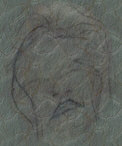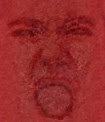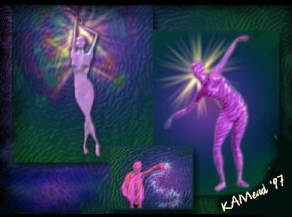Alterations
of the senses.
The alterations of the senses may be either enhancement (more common) or
blunting. The screening mechanism that allows normally functioning
brains to focus, seems to be missing. The end result is that
concentrating, even on simple things, is difficult.
The senses are flooded with stimuli, so the schizophrenic can't separate
one from the other. Noises can be louder, as if someone
turned up the volume on life. Colors may be brighter, sharper.
Hearing may be so sensitive, that sounds interfering with
carrying on a simple conversation. When this
over sensitivity hits all the senses, the schizophrenic may feel
enlightened and give a religious meaning to what they are experiencing.
Religious preoccupation is often listed as an early sign of schizophrenia.
Sensations may also be blunted, including those of
pain. It is not uncommon for schizophrenics to burn their fingers
from cigarettes and not notice. Occasionally, patients have broken
bones, ruptured appendices, etc. without feeling it.
Inability
to sort and interpret incoming sensations.
A schizophrenic's brain is not able to sort, interpret, and respond like
a normal brain; therefore, a schizophrenic's reactions often seem "inappropriate."
The meaning of simple words can be difficult to comprehend because they
have trouble concentrating.
There seems to be a "disconnectedness" to everything. At times, they may
see other people as eyes, ears, nose, each separated and not making up
a whole. Therefore people with schizophrenia
often
think they have seen someone they haven't.
Many persons with schizophrenia prefer to spend time
by themselves, withdrawn, communicating with others as little as possible
because of their inability to sort and interpret stimuli. Inappropriate
response is the root of a schizophrenic's difficulties in
relating to other people.
Schizophrenics also have "loose associations" caused by the jumbling
of thoughts. The mind jumps from subject to subject. Another characteristic
of schizophrenic thinking is the inability to grasp abstract thoughts.
An impairment of the ability to think makes simple tasks like following
directions, riding a bus, or planning meals very difficult. Making up words
(neologisms) is common as the thought process gets in front of the speech
process. Schizophrenics often exhibit thought blocking, which inhibits
them from remembering what they are saying. A final symptom
is often ambivalence, the inability to resolve contradictory thoughts.
The mind may divide on a subject and each of those pieces divides, and
on and on. More
info
back to top
Delusions
and Hallucinations
These
are probably the best known symptoms. Most delusions and hallucinations
are an outgrowth of over acuteness of the senses and
the brain's inability to interpret and respond appropriately to stimuli.
Delusions are false ideas believed by the patient
but not by other people in the culture and which cannot be corrected
by reason. Often this takes the form of believing that everything around
them relates to them in some way. The schizophrenic
finds evidence of this in the overloaded stimuli they receive and
cannot interpret.
-
Paranoid
Delusions: common; may believe he is being watched, controlled,
manipulated or hypnotized; and may be dangerous if acted upon.
-
Grandiose
Delusions: quite common; believes he controls the world, has
a close and personal relationship with powerful, even historical figures
back to top
Hallucinations
are common and represent the end of the spectrum that begins with over
acuteness of senses. The person may hear them occasionally or continuously.
The voices and auditory hallucinations are almost
always unpleasant.
-
Auditory
Hallucinations: most common; hears a swishing or thumping sound,
a repetitive phrase, a voice, choirs, or multiple voices.
-
Visual
Hallucinations: common; sees things that aren't there;
-
Smell
or Touch Hallucinations: smells things that don't exist; feels things
that are imagined.
More
info: Hallucinations
Delusions
back to top
Altered
Sense Of Self.
Ordinary
individuals have a clear sense of self. They know where their bodies stop
and inanimate objects begin. This is not true for many schizophrenics who
are unable to distinguish themselves from other people, distinguish individual
body parts from
each
other. Trying to rectify this can have severe problems if they attempt
to physically correct their perceived problems (i.e. through self mutilation.)
back to top
Changes
in Emotion
Changes
in emotion is one of the most common symptoms of schizophrenia. It
results in individuals who appear to be
unable
to feel emotions at all. Initially experiencing widely fluctuating and
exaggerated emotions, overwhelming guilt, extensive, pervasive, nameless
fear.
Exaggerated
feelings are usually only present early in the disease and then go away.
In advanced stages, there are no emotions at all.
It
is the retention of such feelings and emotions which is the single sharpest
dividing line between schizophrenia and manic depression.
back to top
Changes
in Movement
Some changes in movement are the result of medicines. Repetitive movements
such as ticks, tremors, tongue movement and sucking movements are often
the side effects of medicine. Symptomatic changes include increased
awkwardness and belabored movement. Catatonia , the total absence
of movement, is another form of movement impairment.
back to top
Changes
in Behavior
Changes
in behavior are secondary symptoms. A response to what is going on in the
brain. Withdrawing,
catatonia, mutism (not speaking) are all common. Ritualistic, repetitive
behavior like walking in circles, repeating a movement
are common. Repetitive gestures or adopting an unusual posture are widely
seen. Echolalia (repeating, or parroting what others say) is a common occurrence.
Inappropriate behavior (disrobing or urinating in public, spitting, etc.)
is comparatively rare and can be fixed with medicine. |

Symptoms
Alteration of the Senses
Inability to Sort and Interpret
Delusions and Hallucinatio ns
Altered Sense Of Self
Changes in Emotion
Changes in Movement
Changes in Behavior
What Causes Schizophrenia?
?Heredity - One possible
cause of schizophrenia may be heredity, or genetics. Experts think that
some people inherit a tendency to schizophrenia. In fact, the disorder
tends to "run" in families, but only among blood relatives.
?Environment- Some
researchers believe that events in a person' environment trigger schizophrenia.
Some studies have shown that influenza infection or improper nutrition
during pregnancy and complications during birth may increase the risk that
the baby will develop schizophrenia later in life.
?Combination -Many
researchers believe schizophrenia is likely caused by a complex combination
of gene and environmental factors. Certain people are born with a tendency
to develop the disease. But the disease only appears if these people
are exposed to unusual stresses or traumas.
 Links
Schizophrenia
National Institute of Mental Health
Links
Schizophrenia
National Institute of Mental Health
Schizophrenia Home Page
Schizophrenia Self-diagnosis Test
Various Articles from NAMI/NYC
Family
and Friends Schizophrenics
Handbook for Families
Coping and Support Resources for Families
NARSAD
Warning:
The Internet is a wonderful way to get info. But you must be wary.
On the internet you often do not know where the info is coming from, or
the "views" of the person disseminating the info. The links I have provided
appear to be very knowledgeable. Here is a list of reliable sources:
National Alliance for the
Mentally Ill (NAMI)
National Depressive
and Manic-Depressive Association
National Foundation For Depressive
Illness, Inc.
National Institute of Mental Health
National Institute of Neurological
Disorders
Support Groups, Newsletters,
Seminars (In NY: 212-684-FAMI;
Elsewhere: 1-800-950-NAMI)

If you are dealing with Schizophrenia, you may want to read the next page!
|




